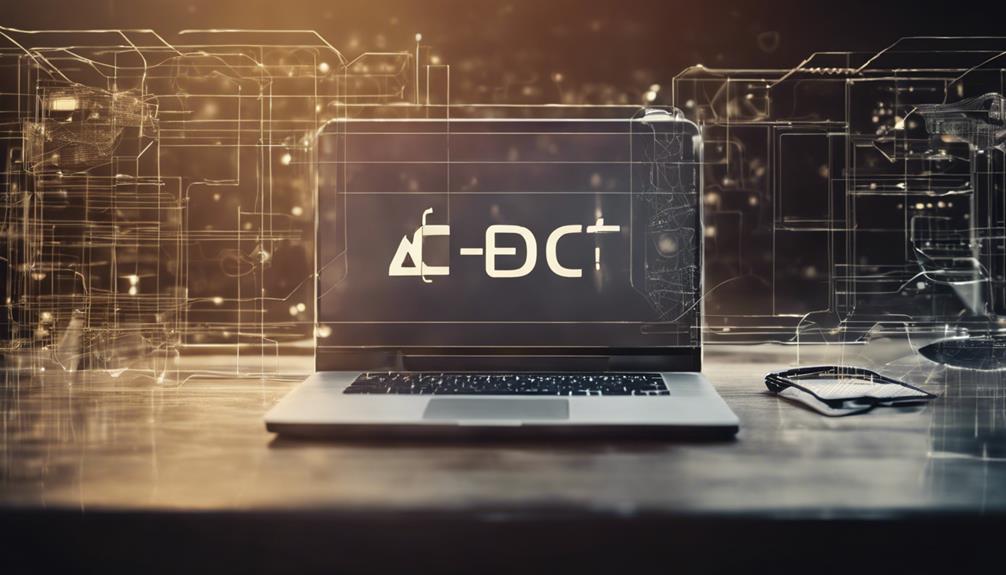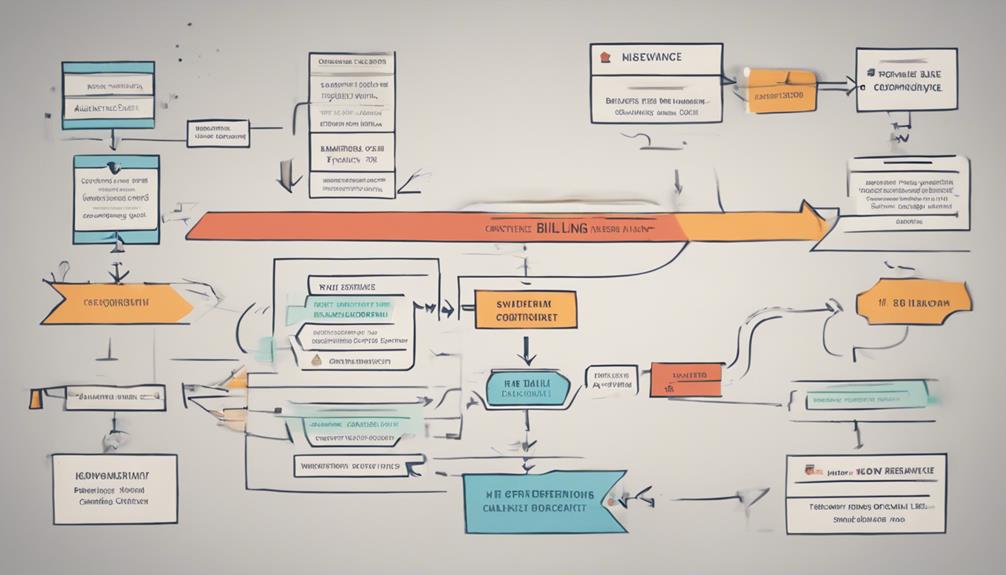When it comes to Electronic Checks (eChecks) and Automated Clearing House (ACH) payments, understanding the differences clarifies the domain of digital transactions. Echecks are digital versions of paper checks processed faster (within 24-48 hours), while ACH payments involve electronic transfers between banks. ACH network links banks for efficient eCheck processing, ensuring seamless fund transfers, standardized procedures, reduced errors, and enhanced security. Echecks fall under the wider umbrella of ACH payments, utilizing the ACH network for streamlined transactions. Delving deeper into these distinctions sheds light on the intricacies of electronic payment methods.
Key Takeaways
- Echecks are digital versions of paper checks processed through the ACH network.
- ACH network facilitates seamless electronic fund transfers between financial institutions.
- Direct deposit transfers funds directly into the recipient's account using the ACH network.
- Understanding terms like eChecks, ACH, and direct deposit aids in navigating electronic payments.
- Echecks offer faster processing times of 24-48 hours compared to traditional checks.
Understanding Echecks and ACH

Interested in understanding the difference between eChecks and ACH payments?
eChecks, also known as electronic checks, are fundamentally digital versions of paper checks. They offer faster processing times, typically within 24-48 hours, compared to traditional paper checks.
On the other hand, ACH (Automated Clearing House) payments are electronic transfers between banks that facilitate various electronic transactions. This network plays a crucial role in enabling electronic transactions to occur smoothly and efficiently.
How Echecks Utilize ACH Network

How does the utilization of the ACH network enhance the efficiency of eChecks processing? When eChecks leverage the ACH network, the process becomes streamlined and secure. Here are some key ways in which eChecks benefit from utilizing the ACH network:
- Seamless electronic transfer of funds between financial institutions
- Standardized procedures guarantee consistent and reliable processing
- Reduced risk of errors or delays in transactions
- Increased convenience for both businesses and customers
- Enhanced security measures safeguard sensitive financial information
Differentiating Echecks and ACH Payments

To distinguish between eChecks and ACH payments, consider their relationship within the electronic payment landscape. eChecks are a type of ACH payment, both facilitated through the Automated Clearing House (ACH) network.
While eChecks refer specifically to digital versions of paper checks processed within 24-48 hours, ACH payments encompass a broader range of electronic payment methods like direct deposits and payments.
Without the ACH network, neither eChecks nor ACH payments would be possible. Essentially, eChecks fall under the umbrella of ACH payments, emphasizing their interconnection and reliance on the ACH infrastructure.
Understanding this relationship clarifies how electronic transactions between financial institutions are enabled and streamlined, highlighting the essential role of the ACH network in modern payment processing.
Clarifying Echecks Vs. Wire Transfers

To better understand the distinctions, let's clarify the difference between eChecks and wire transfers.
- eChecks:
- Processed through ACH network
- Digital alternative to paper checks
- Faster than traditional checks
- Known by various names
- Typically settled in 24-48 hours
In contrast, Wire Transfers:
- Immediate funds transfer
- Higher transaction fees
- Common for domestic and international payments
- Direct bank-to-bank transfer
- More expensive than eChecks
Simplifying Electronic Transaction Terminology

Let's simplify electronic transaction terminology by clarifying key terms and their relationships within the financial ecosystem.
| Term | Definition | Relationship |
|---|---|---|
| eChecks | Digital versions of paper checks processed through the ACH network | A type of transaction enabled by the ACH network |
| ACH | Automated Clearing House network facilitating electronic fund transfers | Backbone for eChecks and various electronic payment methods |
| Direct Deposit | Transfer of funds directly into a recipient's account | Utilizes the ACH network for seamless electronic transactions |
Understanding these terms helps navigate the world of electronic payments. eChecks are a subset of ACH transactions, with the ACH network facilitating secure and efficient fund transfers like direct deposits.
Frequently Asked Questions
What Is the Primary Difference Between Echecks and Wire Transfers?
The primary difference between eChecks and wire transfers lies in their speed and cost. While eChecks are digital versions of paper checks processed through the ACH network within 24-48 hours, wire transfers are immediate and incur higher fees.
EChecks are more suitable for domestic transactions due to their affordability and processing time, whereas wire transfers are preferred for urgent or international payments. Understanding these distinctions can help you choose the right payment method for your needs.
Is Autopay the Same as an ACH Payment?
Autopay differs from an ACH payment. Autopay involves setting up automatic payment schedules. On the other hand, ACH payments are electronic transfers between banks. They encompass various payment methods like eChecks.
Can Echecks Be Used for International Transactions?
Yes, eChecks can generally be used for international transactions, but there are limitations based on the specific financial institutions involved. It's crucial to verify with your bank and the recipient's bank to guarantee compatibility.
International eCheck processing may incur additional fees or longer processing times due to varying banking regulations and systems. Always confirm the details to avoid any surprises or delays when utilizing eChecks for international transactions.
Are There Any Additional Fees Associated With Echecks?
When using eChecks, additional fees may apply, depending on the service provider. These fees can vary and might include charges for processing, transaction volume, or other specific services.
Reviewing the terms and conditions of your eCheck provider is crucial to understand any potential fees associated with using this payment method. Be sure to inquire about any additional costs before initiating eCheck transactions to avoid surprises.
How Secure Are Electronic Transactions Through the ACH Network?
Electronic transactions through the ACH network are secure. The ACH system follows strict protocols to safeguard your financial data. Encrypted transmissions and authentication measures protect transactions.
Your information is kept confidential and secure during electronic transfers. Rest assured, the ACH network prioritizes security to guarantee your peace of mind when conducting digital transactions.
Conclusion
To sum up, exploring the world of electronic checks and ACH payments may seem challenging, but with the right knowledge, you can confidently manage your financial transactions.
Remember, 'knowledge is power,' so take the time to understand the intricacies of eChecks and ACH to make informed decisions and guarantee seamless digital payments.
Stay informed, stay empowered, and embrace the convenience of electronic financial transactions.










